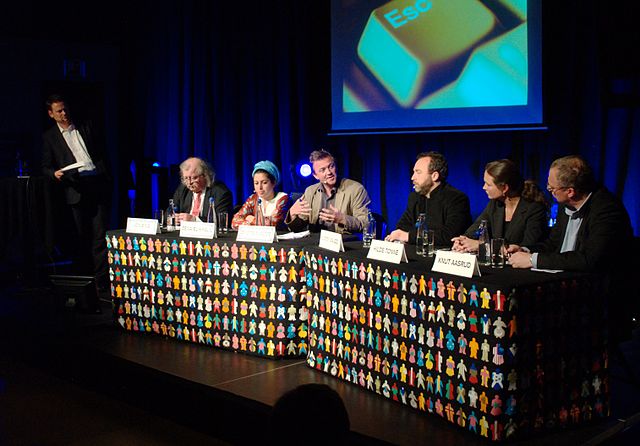Power of the People: Crowdsourcing Political Change


In 2005, Thomas Friedman’s book “The World is Flat” opened the eyes of many to this bubbling phenomenon we now call globalization. The premise of Friedman’s book was that the transformative political changes of the late 70s and 80s, mixed with the major leaps in technology throughout the 90s, analogously developed a recipe that ‘flattened’ the world. In other words, it leveled the economic playing field for the 21st century. Friedman’s thesis is that these metamorphic changes (over the course of 30 years) incited and empowered the most valuable tool of the 21st century: the individual. Now, the power of the individual, along with the power of the digital age, could mean that crowdsourcing political change is a realistic venture.
Today, crowdsourcing serves as one of the most profound examples of Friedman’s predictions. For years, crowdsourcing – the art of leveraging the collective mind of the public toward a desired goal, project or objective – has been an instrumental cog in the wheel of scientific and technological advancements. Some notable examples of its success include: Wikipedia, CAPTCHA, AIDS research (protein M-PMV), crisis management, and even the discovery of new planets.
Of course, there are also pitfalls to crowdsourcing. Without incentives, crowdsourcing projects are futile. This is a troubling problem because a project might be well-funded upfront, motivating its participants to work toward a common goal, but there is never a guarantee that a sourced crowd can provide profitable results -- which has sometimes given crowdsourcing initiatives the label of being unpredictable. But members of the academic community, as well as think-tank organizations and small-businesses, have been tackling these sorts of problems for years with sensible solutions and titular adjustments -- which are now producing notable enhancements to an already powerful engine in crowdsourcing.
However, the demonstrative precedent of utility that crowdsourcing provides for some fields has never been exploited for solving the problems that we find in modern civics. But this is rapidly changing.
After studying recent trends across the nation, and discovering countless successes abroad, I have officially become a believer in the power of crowdsourcing. I now have no doubt how crowdsourcing can change the future of America. Here are just a few of reasons why:
1. E-Directing the Legislative Process: It is common knowledge that the polarization in congress is surging. This shift towards ideological extremism has drowned the voices of the independent voting electorate (swing voters, moderates, centrists).
But independents might have a renewed source of empowerment -- crowdsourcing the lawmaking process.
This idea was recently proposed in the Philippines by Filipino Senator Teofisto Guingona. The bill, called the Crowdsourcing Act of 2012, seeks to engage the public into legislative affairs like never before. In a statement to a Manila newspaper, Senator Guingona explained the law’s intent:
“The bill seeks to expand the avenues of participation to the online community. It seeks to harness the productive and effective power of social media. It seeks to give a voice to netizens. People participation must go beyond physical borders.”
Under the direction of this legislation, Filipino citizens would be able to communicate, participate, and respond to legislative proceedings and members of their congress, in real-time -- throughout every step of process.
2. Citizen Journalism: In 2011, the world was astounded by the contagion of protests throughout the Middle East. They proliferated across the Sahara until the dictatorial hegemonies in Egypt, Tunisia, and Libya finally collapsed. This, of course, is what we now refer to as the Arab Spring.
Aside from the Arab peoples themselves, these regime changes were only made possible by the utilization of 21st century technology (i.e. smart phones and broadband). These technologies served as pillars for communication and organization within the movement. But without optimizing these technologies through crowdsourcing havens, like Twitter and Youtube, an Arab Spring would have never risen.
Learning from this paradigm, institutions across the world are now adopting crowdsourcing techniques ranging from local police departments to thriving global news agencies.
Citizen journalism is now another unique surrogate derived from crowdsourcing initiatives. This was highlighted by award winning British journalist Paul Lewis in a 2011 TED speech, “Crowdsourcing the News.”
According to Lewis, much of his journalistic success has been accomplished by capitalizing on crowdsourcing initiatives he integrated with social media platforms. He pronounced that this pairing, between social media and crowdsourcing, will create a “new layer of accountability” for governments and organizations. This is because the pairing constructs a global gateway for instant communication and distribution of digital materials like photos, videos, and personal testimonies.
3. Malleable Constitutions: The US Constitution has been a renowned symbol of democracy for centuries. It would be difficult to describe an America today without its guidance and foresight. Yet, despite its majesty, this sacred document is far from infallible. It has only survived the test of time because of its malleability, amended twenty-seven in its lifetime; however, it would be naïve to believe that, at some point, it would not have to be amended again. This is how crowdsourcing might help.
During the brink of an economic collapse in 2008, Iceland decided to scrap their constitution and crowdsource a new one. Using social media platforms like Facebook and Flickr, members of a constitutional council took comments and feedback from their citizens in an effort to rebuild their constitution. After four years of development, a new Icelandic Constitution has emerged. The current laws state that a new constitution can 'only' be adopted after it has won the popular vote in a public referendum which took place on October 20th 2012. The public referendum has passed with 2/3 of the public supporting the new constitution.
This constitutional experiment is a first for the world, but it will certainly not be the last time that we see crowdsourcing change the course of history.




